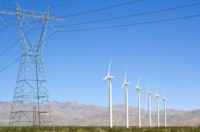Commentary
Energy Viewpoint: Evolving Action on Climate Change Accelerates to a Glacial Pace
Climate change and its causes were not much discussed during the 2016 U.S. general election, but the issue has not gone away. If the scientific finding that human activities are causing climate change with greenhouse-gas emissions is correct, reductions in GHG emissions will be inevitable. For the energy construction industry, that would mean more renewable-energy power plants, fewer coal and natural-gas plants, fewer oil and gas pipelines, new energy-storage projects, possibly even carbon capture and storage, more nuclear power construction and similar market changes.
A small but influential segment of the population has obstructed action to reduce emissions mostly on ideological, rather than scientific, grounds, citing concerns about interference with the operation of the free-market economy, building large government bureaucracies and similar curtailments of liberty. But that resistance is beginning to crumble.
Great physical changes in the Earth—think evolution, coal or oil formation, continental drift—occur on a geological scale. This is one reason for the controversies swirling about climate change. People who dispute the claim that the climate is rapidly changing look back over their own lifetimes and see only what to them seems an ordinary succession of weather events and temperatures, severe in some years, less so in others: In their experience, that’s the norm.
But advancements in science have improved our ability to detect and measure changes that are not noticeable on a human scale, i.e., during an individual’s lifetime. For the last 30 years, the microscope of science increasingly has focused on gauging change in the climate, understanding its causes and projecting likely future scenarios based on the data. This is a function performed without controversy by many U.S. government bodies, including the Energy Information Administration, which issues an Annual Energy Outlook to aid planning by companies, agencies and organizations in the energy industry.
The resistance to climate action was expressed about 2007 by blanket denial that the climate was changing, and that position remained unchanged for about five years. But the threat does not go away if an ostrich, to avoid seeing it, sticks its head in the sand. By 2012, people were observing extreme weather events and the climate data were showing persistent global temperature increases. Public opinion began to change. Politicians challenged on their denial then fell back on the foolish assertion, “I’m not a scientist,” earning ridicule for their evasion. Since then, for a variety of reasons, opinions about climate change and the reasons for it have continued to shift. More Americans now are accepting that the climate is changing, though not all of them are accepting the scientific explanation for the change.
The shift in public views of climate change and climate action is moving faster than a geological scale but slower than a human scale. Let’s call it a glacial pace.
One recent sign of the acceleration to glacial was apparent in the responses of some of President Donald Trump’s Cabinet nominees at their Senate confirmation hearings. Scott Pruitt, former Oklahoma attorney general; Rex Tillerson, former Exxon Mobil CEO; and Rick Perry, former Texas governor, either used cleverly crafted evasions or expressed some degree of acceptance of the science behind the climate-change issue rather than resort to flat denial as in the past.
In early February, the Climate Leadership Council, a group of Republican senior statesmen, with service credentials dating back to the Reagan administration, proposed swapping all Obama administration climate measures for a carbon tax. The proposal sparked little enthusiasm and the details are largely immaterial; the point is that high-profile Republicans with serious credentials felt that climate change caused by human activities demanded a political response.
Something comparable happened on Feb. 13, when a collection of governors from both parties—including Kansas Gov. Sam Brownback (R), who has intentionally made his state a free-market guinea pig—wrote to Pres. Trump promoting the benefits of renewable energy power plants. They weren’t directly acknowledging the validity of climate science, but they were pitching one part of the solution it requires. And that to a president who is committed to all forms of carbon-based fuels.
The change has not yet sped up to a snail’s pace, so for now, we’ll settle for glacial.
Tom Armistead is the consulting editor of ENR Energy. After a 23-year career in construction, he served 12 years as an ENR editor, first for power and industrial news and subsequently for energy news.



